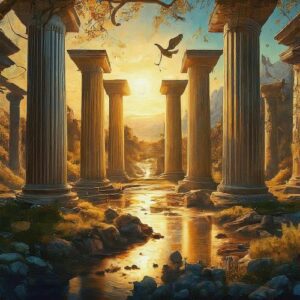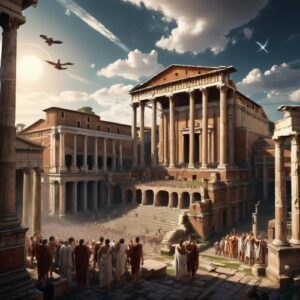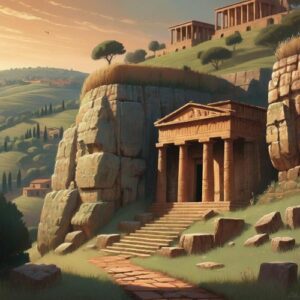Mediterranean Mythology
Mediterranean mythology brings together the rich traditions of the Greek, Roman, and Etruscan worlds, forming one of the most influential bodies of myth in human history. These interconnected stories and beliefs not only shaped the cultures of the ancient Mediterranean but also left a profound mark on literature, philosophy, art, and religion across the globe. At the heart of Mediterranean mythology lies the interaction between gods and mortals, the mysteries of life and death, and the search for order in a world governed by divine will. While each culture offered its own pantheon and interpretations, their myths often intertwined, reflecting centuries of exchange and adaptation among neighboring civilizations.
Greek mythology stands as one of the most recognized components of Mediterranean mythology, with its tales of Olympian gods, epic heroes, and cosmic battles. Figures like Zeus, Athena, Apollo, and Aphrodite, along with stories of Heracles, Perseus, and Odysseus, became symbols of courage, wisdom, and divine-human interaction. The Greeks used mythology to explain natural phenomena, moral lessons, and the structure of the universe. Their myths were passed down through epic poetry, such as Homer’s Iliad and Odyssey, and through tragedies and dramas that explored human fate and divine justice. These stories became so foundational that they influenced not only Greek culture but also the myths and practices of Rome and beyond.
Roman mythology, while often borrowing directly from the Greek, infused these stories with new cultural meanings and emphasized civic duty, family, and the authority of the state. Jupiter replaced Zeus as the supreme deity, alongside Juno and Minerva as part of the Capitoline triad. Myths of Romulus and Remus, the founding of Rome, and the divine ancestry of rulers tied mythology closely to political and social identity. Roman rituals and festivals reinforced the connection between gods and daily life, while their adaptation of Greek gods allowed Mediterranean mythology to spread across the vast Roman Empire. The Romans also preserved Etruscan practices, such as divination, demonstrating how mythology in the Mediterranean was an ever-evolving blend of beliefs.
Etruscan mythology adds a unique dimension to Mediterranean mythology by highlighting a worldview deeply concerned with destiny, divine messages, and the afterlife. Gods like Tinia, Uni, and Menrva paralleled Greek counterparts but carried distinctive attributes rooted in Italic tradition. Their mythology included darker figures such as Charun, the demon of death, and Vanth, the winged guide of souls, underscoring their focus on life’s transience and the journey beyond death. These ideas influenced Roman religious practice and helped shape how Mediterranean mythology as a whole came to balance themes of life, order, and mortality. Today, Mediterranean mythology continues to inspire literature, art, and popular culture, serving as a timeless reflection of the ancient world’s search for meaning and harmony.




